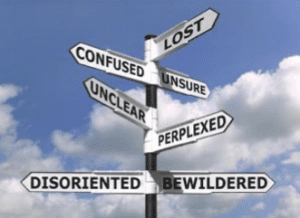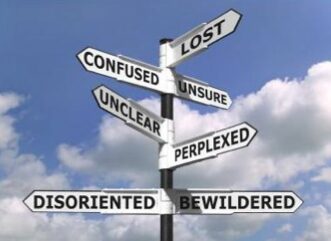 Uncertainty in a postmodern society – reflection by Fr. Tim Williams, Director of the Daughters of Charity in Australia
Uncertainty in a postmodern society – reflection by Fr. Tim Williams, Director of the Daughters of Charity in Australia
THE GIFT OF UNCERTAINTY
Uncertainty a gift ? How could that be ? Do we really want to live in a world of uncertainty ? Well, perhaps we have no choice !! In his book titled God’s Mission and Postmodern Culture – The Gift of Uncertainty (1) John Sivalon MM lists “uncertainty” as one of the characteristics of a postmodern society. And he sees uncertainty as an opportunity rather than the nemesis of the Christian Faith.
Along with uncertainty, Sivalon has observations on what he sees as other characteristics of a postmodern society: – individualism, acceptance of pluralism in religious views, suspicion of absolute or universal claims in regard to belief, rejection of a meta-narrative (i.e., one single set of governing ideas) for world salvation, a deeper understanding of the complexity of the world we live in, a sense of belief in different types of mystery, the reality of a variety of socially constructed frameworks some of which are unpredictable, all truth as relative, and more … .
Amongst all of the above, uncertainty doesn’t seem so bad !
Sivalon bolsters his argument for accepting and even embracing the presence of uncertainty in our postmodern society by invoking the uncertainty that is revealed in the current world of science, viz., in quantum physics which deals extensively with details and models of what happens when we try to ascertain the nature of things at subatomic level. (By subatomic is meant the behaviour of particles within and associated with the nucleus of an atom). Classical models of an atom do not work at this level and models based on probability (what is most likely to be the situation) and an uncertainty principle (I cannot observe something at this level without having an effect on it so how can I be certain of its true state ?) are what we are left with. The result is that to postulate a model of an atom in today’s world, we are dependent on probability and mathematical models.
Sivalon would argue that if such uncertainty exists at the level of very basic physical reality, should we then be upset if it also occurs in society, in our lives, in our beliefs and values, in our culture ? There are of course those who would try to reduce all religious and ethical life to rules, and persuade us there is no room for uncertainty in religious life, spirituality or faith – even though our own experience tells us otherwise.
Mission in a postmodern culture
Sivalon, writing from his own missionary experience, and that of others, suggests that when we look at mission, we should look at the culture of our society as we would at the culture of a particular ethnic group. That is, from the point of view of mission, we do not primarily work in a culture with the ideas of changing it to suit ourselves. Rather, we go into a culture not so much to bring our ideas of salvation, or worse, to force our own views on the culture, but we see mission, (the Mission of God, rather the mission of ourselves) as having the aim to show where God can be found in that culture. If we regard the culture of the society in which we find ourselves as we would regard an ethnic culture, then our mission in a postmodern society is to discover God in that culture, and help others to find God there too.
And who or what is this God ? Sivalon expands the notion of uncertainty he speaks of in nature to apply to God as Trinity. While not departing from the accepted formula of Trinity as God as Father, Son and Holy Spirit, he goes beyond the tight credal concepts and their customary definition to a more expansive notion of Trinity as Persons who are what they are because of their relationships with each other, to a Father is not just an initial Creator, but involved in an ongoing relationship with an uncertain world. to an Incarnation and sending of the Spirit which are not just single events, but are a continuous and sometimes blurred relationship, from our point of view, with the World. This is a wider notion of Trinity than we might be used to, and it blurs the edges of certainty and conciseness sometimes associated with classic ideas of Trinitarian Formulae.
For Sivalon, uncertainty is the lot of most ordinary people for whom many parts of their lives are passed in grey areas, where it is not possible to reduce every facet of life to fit into the constrained limits of restrictive rules and formulae. In a world of uncertainty, there is room and opportunity for those who are searching with good will, and there are many people in our postmodern society who are like this. For these people uncertainty is a gift which leaves room for faith – and for the Mission of God.
Like secularism (2), uncertainty can be seen as an opportunity rather than a problem.
FOR REFLECTION
1. Louise de Marillac, whose feast we celebrated on March 15, certainly had some times of uncertainty in her life.
- Which of these times do you recall ?
- How did Louise deal with such times ?
2. What times of uncertainty have you experienced in your life ?
- In your Mission ?
- How do you usually deal with these times ?
- Is there any major uncertainty in your life at the moment ?
1 Sivalon MM, John C, God’s Mission and Postmodern Culture – The Gift of Uncertainty, Orbis Books, Maryknoll New York, 2012. Tim Williams CM May 5, 2014 1
2 Williams CM, T., A Secular Society – Problem or Opportunity ?, Reflection to Daughters of Charity, Australia, December 3, 2013. 2
Tags: Australia, CM, Congregation of the Mission, Daughters of Charity, Timothy Williams

